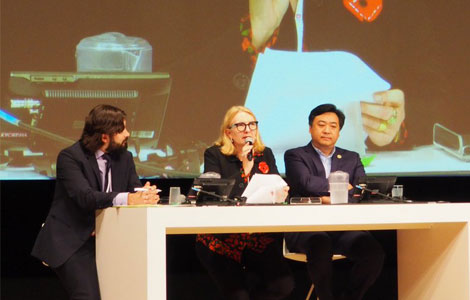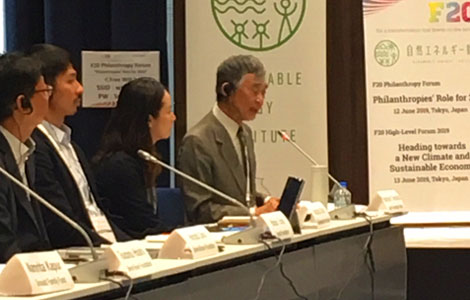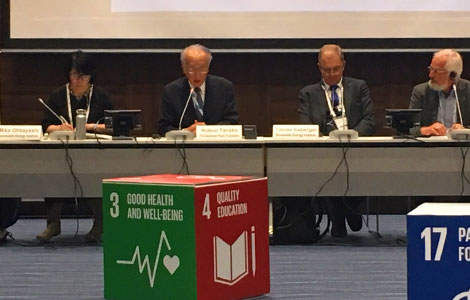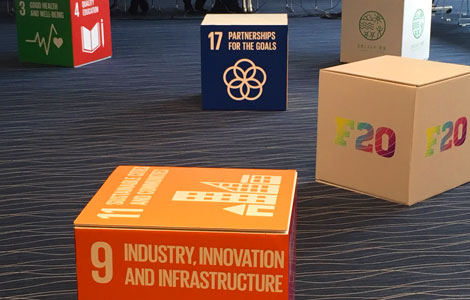The SDGs set 17 social, economic, health, education and environmental goals for the world to achieve by 2030.
After reflecting on the presentations and conversations at F20, I think there is some exciting potential for philanthropy organisations to become more active in connecting the dots between the climate transition, inclusion and equality.
I have two suggestions:
- We can choose to work on a climate transition issue that is relevant to our current philanthropy strategies; and/or;
- We can apply a climate lens over all our work and ensure that all new programs and buildings aim to achieve both social and energy efficiency outcomes.
At Lord Mayor’s Charitable Foundation our grantmaking is contributing to achieving the SDGs.

Dr Catherine Brown participates in the F20 panel discussion, “The Implementation of the Paris Agreement and 2030 Agenda - Role of Foundations”.
Energy Efficiency
The Foundation began working with Renew on an energy efficiency pilot project involving nine sites owned by not-for-profit organisations.
We have now grown this to 50 sites and have begun working directly on several projects that reach many low-income households. For example, we have a partnership with the peak body for affordable housing, Community Housing Industry Association, and are now rolling our energy efficient audits using an online model.
We are also working with Brotherhood of St Laurence, which is one of the largest community service organisations in Melbourne. These organisations and their tenants are reducing carbon emissions and also saving electricity costs, which is a double benefit.
 Delegates at the F20 Conference in Tokyo.
Delegates at the F20 Conference in Tokyo.
Foodprint Melbourne
One of the most impactful projects we have supported and collaborated on over five years is the Foodprint project with The University of Melbourne and Sustain, the local sustainable food network.
FoodPrint has mapped Melbourne’s food bowl, celebrating our potential to provide 82 per cent of our fruit and vegetable needs within the Greater Melbourne and peri urban fringe, and identifying the biggest risks and stressors.
Critical issues include the risk of overdevelopment of valuable agricultural land on the city’s fringe, the need to drought proof our foodbowl and the potential to reuse water from water treatment plants in urban agriculture.
Foodprint’s latest report is A Roadmap for a Resilient and Sustainable Melbourne Foodbowl. It proposes an integrated approach and highlights the need for farmland protection, water access, nutrient recycling and sustainable farming. The Foodprint reports have been downloaded extensively and the model is attracting interest from other cities.
 Panel discussions at the F20 Conference in Tokyo.
Panel discussions at the F20 Conference in Tokyo.
Climate lens
We are applying a climate lens across our strategic priorities. This can lead to both social and environmental benefits.
- We require high energy efficiency ratings in all new or redevelopment projects for affordable housing projects.
- We support youth unemployment projects that encourage jobs in the new economy, such as green plumbing, a social enterprise to produce solar hot water services, and urban agriculture.
- We added the health impacts of climate change to our work in health, for example, our Hot Spots initiative which is building community resilience to heatwaves and is being piloted in three Melbourne communities.
Sustainable affordable housing
In the Affordable Housing Challenge, which we have been undertaking with the City of Darebin as the site partner, we included proximity to public transport and services within the site location criteria.
We are giving higher weightings to affordable housing projects with excellent energy efficiency. For example, the redeveloped Ozanam House by VincentCare is rated best practice 5 star Green star.
Philanthropy’s role
Philanthropy can help the community reduce emissions, adapt to a changing climate and equitably adjust as the economy transitions. We have a special role for a few reasons:
- We bring a lens of overcoming disadvantage to all of our work.
- We can provide early support to projects to help not-for-profit organisations and communities test solutions and new models, which might not yet fit the risk appetite of business or government.
- We have a long-term time horizon and have can help develop knowledge through funding research on emerging issues and opportunities, for example, Foodprint Melbourne.
- We can support and be part of collaborations between sectors, for example, our support of Cities Power Partnership.
It was uplifting at F20 to recognise the potential for philanthropic foundations all around the world to make a contribution to the transition to a low carbon world, helping ensure that no one gets left behind.
Dr Catherine Brown
Chief Executive Officer
